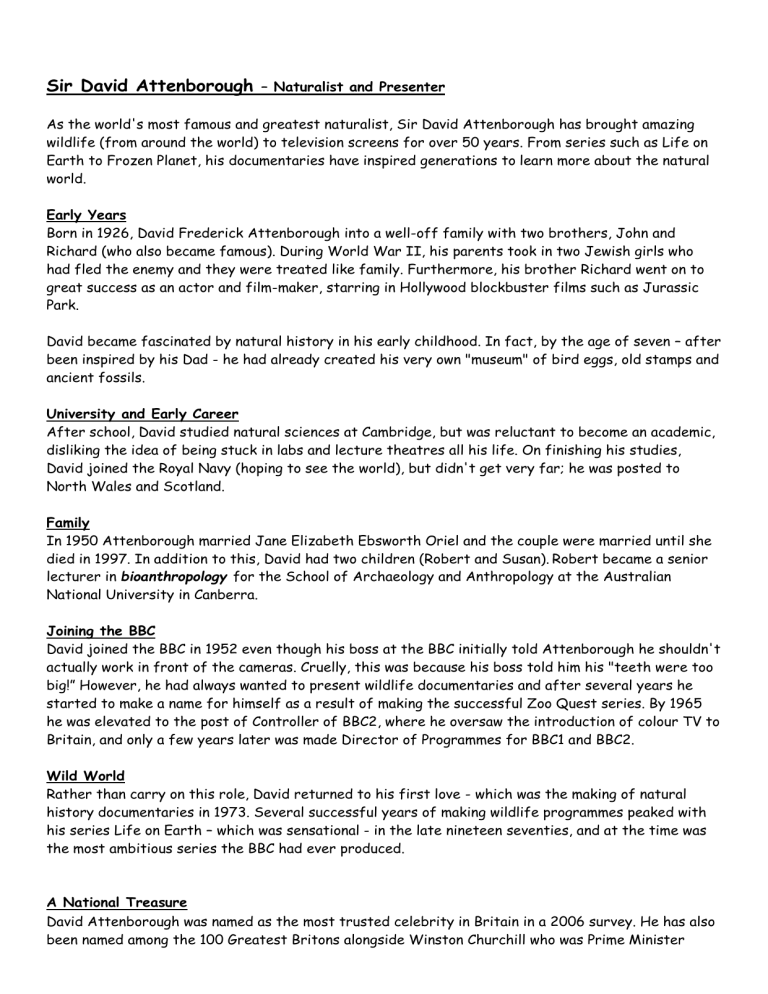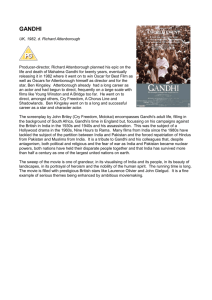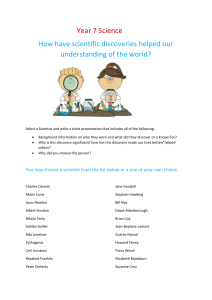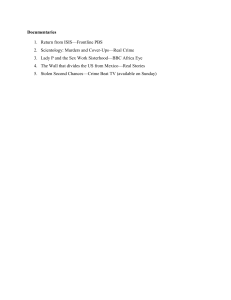
Sir David Attenborough – Naturalist and Presenter As the world's most famous and greatest naturalist, Sir David Attenborough has brought amazing wildlife (from around the world) to television screens for over 50 years. From series such as Life on Earth to Frozen Planet, his documentaries have inspired generations to learn more about the natural world. Early Years Born in 1926, David Frederick Attenborough into a well-off family with two brothers, John and Richard (who also became famous). During World War II, his parents took in two Jewish girls who had fled the enemy and they were treated like family. Furthermore, his brother Richard went on to great success as an actor and film-maker, starring in Hollywood blockbuster films such as Jurassic Park. David became fascinated by natural history in his early childhood. In fact, by the age of seven – after been inspired by his Dad - he had already created his very own "museum" of bird eggs, old stamps and ancient fossils. University and Early Career After school, David studied natural sciences at Cambridge, but was reluctant to become an academic, disliking the idea of being stuck in labs and lecture theatres all his life. On finishing his studies, David joined the Royal Navy (hoping to see the world), but didn't get very far; he was posted to North Wales and Scotland. Family In 1950 Attenborough married Jane Elizabeth Ebsworth Oriel and the couple were married until she died in 1997. In addition to this, David had two children (Robert and Susan). Robert became a senior lecturer in bioanthropology for the School of Archaeology and Anthropology at the Australian National University in Canberra. Joining the BBC David joined the BBC in 1952 even though his boss at the BBC initially told Attenborough he shouldn't actually work in front of the cameras. Cruelly, this was because his boss told him his "teeth were too big!” However, he had always wanted to present wildlife documentaries and after several years he started to make a name for himself as a result of making the successful Zoo Quest series. By 1965 he was elevated to the post of Controller of BBC2, where he oversaw the introduction of colour TV to Britain, and only a few years later was made Director of Programmes for BBC1 and BBC2. Wild World Rather than carry on this role, David returned to his first love - which was the making of natural history documentaries in 1973. Several successful years of making wildlife programmes peaked with his series Life on Earth – which was sensational - in the late nineteen seventies, and at the time was the most ambitious series the BBC had ever produced. A National Treasure David Attenborough was named as the most trusted celebrity in Britain in a 2006 survey. He has also been named among the 100 Greatest Britons alongside Winston Churchill who was Prime Minister during World War 2. At the age of 90, he is still producing natural history and films and has no intention of stopping. He said, “I just wish the world was twice as big and half of it was still unexplored.” It is clear to see that this inspirational man has achieved so much. However, he still has the motivation to carry on captivating the viewers with his wonderful documentaries which have influenced and inspired generations. * Bioanthropology the study of how humans evolved





